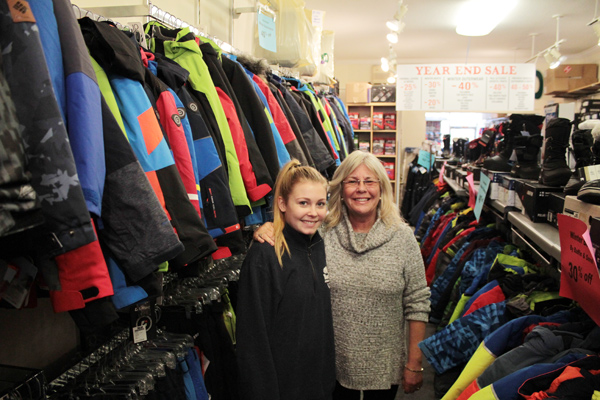By Jacob Hoytema –
It’s obvious that Sheba Schmidt and Gabriella Hilkes of West End Kids have the kind of friendly owner-employee relationship that can only exist in a small business. While they sat in a Westboro café for an interview for this piece, Sheba, who owns the children’s clothing store with her husband Gordie, interrupts a thought to glance out the window. “You see that cute snow suit that just walked by? That was from us,” she says to Gabriella. Gabriella recognizes it and they share a laugh at the coincidence.
Gabriella is a university student who has worked at West End Kids for more than two years, starting when she was in high school. She is receiving a pay raise due to the new $14 minimum wage that came into effect January 1. Sheba estimates having hired over a hundred such young employees throughout her two decades of business. While she says she is happy for the sake of employees like Gabriella, she admits that the wage increase will put financial pressure on the store. “It’s a substantial increase in my overhead,” she explains. “I’m not going to discuss dollars and cents, but it’s substantial, and it’s concerning.” While she’s confident that her business can handle it, she will still have to cut down on hours for part-timers during the “leaner” sales months of the year.
Sheba says that the province could have handled the wage increase better, perhaps by introducing it in smaller increments or with more consultation. Gabriella says she appreciates the pay hike because it will help her pay for university expenses. Ultimately though, the gaze at West End Kids is toward the future, and Sheba says she’s determined to work with her staff to “make the best of it.”
“Me and my staff, we’re a team,” she says.

Cutting some part-time hours can be read as a relatively moderate reaction to the new wage in comparison to some drastic measures appearing across the province: taking away tips or benefits, upping consumer prices, or closing down completely. Small businesses will certainly feel the impact from the increase. For now, cutting part-time hours seems to be the most popular reaction in Kitchissippi.
Nu Grocery in Wellington West, for example, is choosing similar shift-shearing measures. They’re a much younger business than West End Kids, having only opened last summer. Founder and owner, Valerie Leloup, says that as a supporter of a living wage, she is “absolutely in favour” of the policy, but recognizes it may be a challenge for her. “For a new business like us, which is still at the beginning, and not making profits yet, it is for sure tough,” Valerie explains. “I am not saying we cannot weather it — we will weather it.”
The Piggy Market, a food shop in Westboro, is a locally owned business that isn’t impacted by the new wage. Co-owner Dave Neil says they decided to pay their workers a living wage about two years ago. “When we made our switch a long time ago, it affected us a little bit in the short term, but we got over that hump,” he recalls.
Dennis Van Staalduinen, Executive Director of the Wellington West Business Improvement Area, says his organization understands business owners have differing views of the new wage. “We try to say, ‘look, our members see both sides of the issue,’” he says, explaining that while higher wages can mean more spending on the local level, the “suddenness and proportion,” can be a shock to many businesses. The next step, he says, will be businesses making adjustments to the change.
These sentiments from the business community — the “hump,” “weathering it,” “making adjustments” — all seem to hit the same basic idea: that the small business ecosystem of Kitchissippi is strong, and prepared to adapt, thrive, and, as Sheba says, “make the best of it.”
Gabriella Hilkes and Sheba Schmidt of West End Kids. “We are constantly given compliments on how amazing staff is, and how much staff we have, and I’m going to keep it that way,” says Sheba.
Related: read the latest News from Nepean column about student employment.
